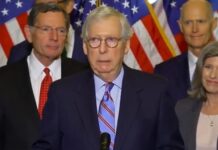By Suzanne Bowdey
The Washington Stand
Despite a nagging budget deadline and rumors about his job security, House Speaker Mike Johnson (R-La.) was “all smiles” this weekend when he sat down to talk with Family Research Council President Tony Perkins. “It does feel very much like we will have a new morning in America,” he said with more energy than someone who’s been on the campaign trail for months should have. “The team in Washington is very excited,” Johnson pointed out. But one thing they shouldn’t expect, he warned, is a break.
“I have [had] so many friends over the last couple of days since the election congratulate us and say, ‘Oh boy, do you finally get to get a nap?’ And I just laugh and I say, ‘A nap? Are you kidding?’ Now the hard work really begins,” the young Louisianan explained. “So we’re ready for that. We’re all counting on a very aggressive work agenda. I’ve told all the members, the incumbents, [and] the new people coming in, ‘Get ready. Tell your spouses — this is not going to be leisure time. We have so much to do. And in relative terms a small amount of time to do it.’ So [we’re] hard, hard at work already.”
Despite the wildly off-the-mark predictions about the election, the speaker insists he never doubted Donald Trump’s chances. “Look, I was on the campaign trail for a year … traversing the country. By the way, they logged the miles, and my team calculated that I logged enough miles to circumnavigate the globe 5.49 times. That’s how many places we went — over 350 campaign events in more than 250 cities in 40 states.” But, he emphasized, “the reason it’s relevant this morning is because that was informing our perspective, our expectation about the election. And I was saying — and we said on this program many times — that I expected that we would grow the majority. I felt in my gut that we would have a floor of a five-seat majority, but on a good night, it could be much higher. So we’ll see.”
Johnson acknowledged that the House races are a different beast, because “the Senate races track almost exactly with the outcome of the presidential in each state.” Apart from the local aspect of the House races, there was also the matter of spending. As Axios notes, Democrats radically outspent the GOP in the 10 most expensive contests across New York, Michigan, California, Maine, Colorado, Michigan, and North Carolina. Incredibly, “the candidates, parties and outside super PACs are on track to spend $283 million in TV and digital ads, according to data compiled by AdImpact” in October. “That’s not far off from what President George W. Bush spent on his entire presidential campaign 20 years ago — $345 million.”
But at the end of the day, money couldn’t make up for the Democrats’ biggest void: values. Asked if the election met Trump’s expectations, the speaker replied that the former president never doubted it. “We believed that we could win decisively. … And the president wouldn’t handicap it. We didn’t want to say how many states we could [win], but there was talk in the last couple of weeks leading up to the election that there might actually be a sweep of the swing states, and it looks indeed as though that will probably be the case. It was a mandate. There was an overwhelming sense in the country that they’re not buying what the radical Left has been selling. … But I think what happened is [that], in a brief kind of one-sentence summary, the woke progressive Left pushed the pendulum too far. They just went too far with their crazy ideology and agenda and the attacks on Americans who did not buy into that. Thankfully for you and me and all of us, the American people are smart.”
At the end of the day, what last Tuesday proved, is that the Left is insanely outside the mainstream on the issues that matter most. “So many people voted for President Trump because he represented a change and a turn away from that radical nonsense. And I think we’ve done that as a nation. And so, we’re still a center-right country, and we’ve got to govern in that way. And I think we’re going to turn this around.”
Kamala Harris’s fixation with making it easier to kill innocent unborn babies wasn’t nearly the priority Democrats thought it would be for voters. In fact, one of the most embarrassing storylines of the campaign should be that the vice president won a smaller percentage of the female vote than Joe Biden did four years ago. “And what that tells me,” Perkins argued, “is that many women in this country are more concerned about putting food on the table for their families than aborting their babies, which is what Kamala Harris made her top policy priority.”
The speaker agreed, pointing to the much-talked-about demographic realignment in the GOP — in large part because of Harris’s absurd obsession with transgenderism and “reproductive rights.” “It certainly happened in all the different categories we discussed with black voters and Hispanic and Latino voters and Jewish voters and all the rest, but certainly among women as well. In the final analysis, [it] shows that President Trump gained with women because he was talking about things that he really cared about, their highest priorities. It’s interesting, one other footnote — [and] there’s so many statistics and things that can be unpacked — but it’s interesting to note that Kamala Harris did not outperform Joe Biden in a single county in America. She performed worse than he did. … I mean, 90% of their campaign was on abortion. The American people did not respond to it. They [rejected it].”
For now, Johnson explained, the GOP’s big focus is putting the past four years behind them. “We have very detailed plans,” the Louisianan wanted people to know. What a lot of Americans may not realize is that Republicans have been putting together key pieces of the agenda behind the scenes in hopes that Republicans would prevail. “For the last year, we’ve been working methodically behind the scenes to develop and design that playbook. [A] lot of work and hours have gone into this. … Among the menu of options,” he detailed, “We’ve got to secure the border on day one, there will be an executive order to do that, followed by legislation that will seal and secure the border. … [We’ll also have to] deal with the fallout of the madness that has ensued over the last four years with regard to all of that.”
Then, provided the House maintains control, Congress will turn its attention to the tax code. “You remember the tax cuts of the Trump administration?” the speaker asked. “The first [wave] will expire this year unless we extend them. And so, we’ve got to do that. And we have a lot of work to fine-tune and ensure that we have the right conditions in the economy to spur on a pro-growth economy. And that’s what’s desperately needed right now — to turn the economy around.” Next on deck is a focused effort to reform the regulatory process, and “energy policy is key to this,” he outlined. “So the bottom line is … in the first hundred days of the new Congress, beginning in early January, we’ll be able to take the field and start putting points on the board early, and then we will develop the agenda as the time goes forward. And we will make President Trump, and I believe this next Congress, the most consequential of the modern era.”
In the meantime, he prays, as we all do, that America survives this volatile time internationally. “The risk is great,” Johnson underscored. “We’re in a heightened threat environment. We have been for some time because of the lack of leadership from the White House. And in fact, it was worse than a lack of leadership; it was the projection of weakness on the world stage. And as we’ve discussed so many times, that is what has inspired … the aggression by our enemies. And so, they are watching this. I think our enemies are very concerned and frightened, frankly, that President Trump beat Kamala Harris. I think they wanted more weakness in the White House. And they’re going to get the opposite. So, you look at that, and you wonder what effect that has over the next couple of months.”
The speaker’s hope is that America’s adversaries take the common-sense approach and back off, “because they know that under the new commander-in-chief, [there’s] a new sheriff in town. And we’re not going to put up with that; we’re going to project peace through strength again. So I think that is a deterrent.”
For now, people of faith need to be in prayer — not just about this period of transition, but also about the decisions being made about the next generation of agency leaders and White House personnel. Above all, Johnson reiterated, striking a reflective tone, “I think this is a [really] important opportunity that I believe God has given us. I think He’s going to give us an opportunity to save America. And so, we need wisdom. We need teamwork and an esprit de corps among those who are going to be deeply involved in this and that.” We can’t, he implored, “waste any time. [We need to be] good stewards of this opportunity that we’ve been given. And I’m very prayerful about that. I know so many of my colleagues are of that same spirit.” Above all, “We need God’s favor and his blessing so that we can do what we need to do — and fulfill our duty to turn the country around.”
















